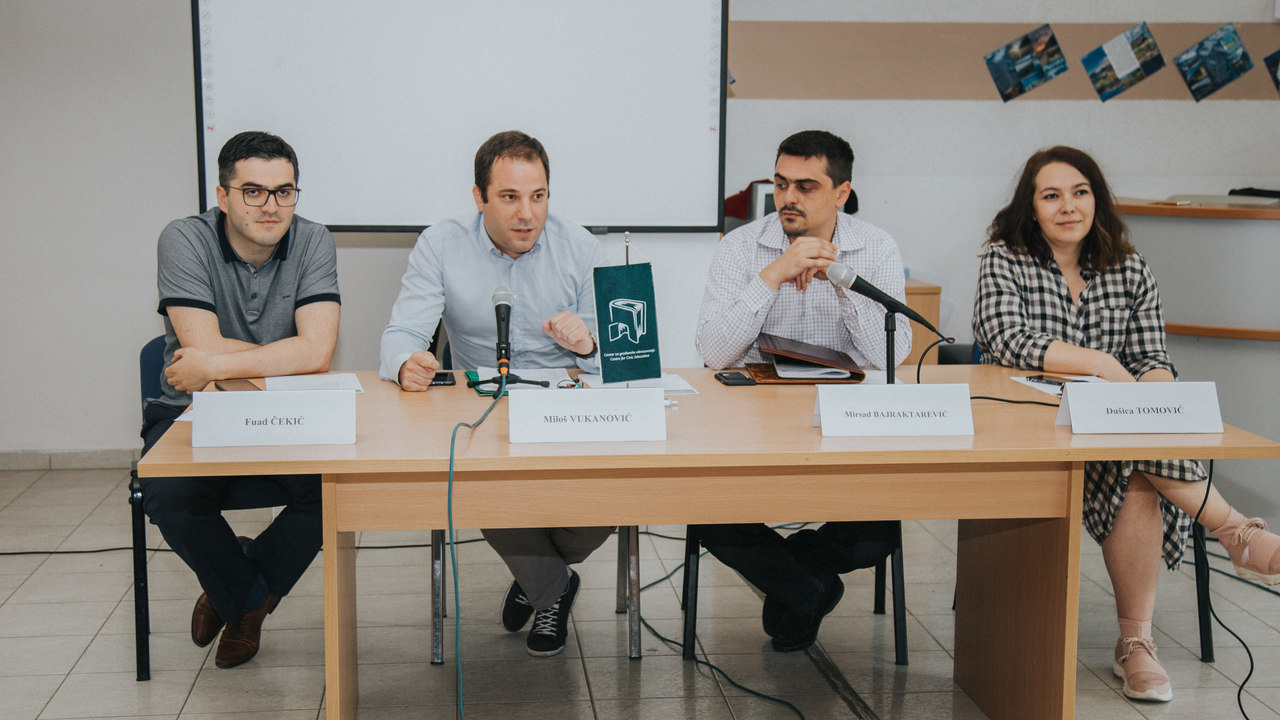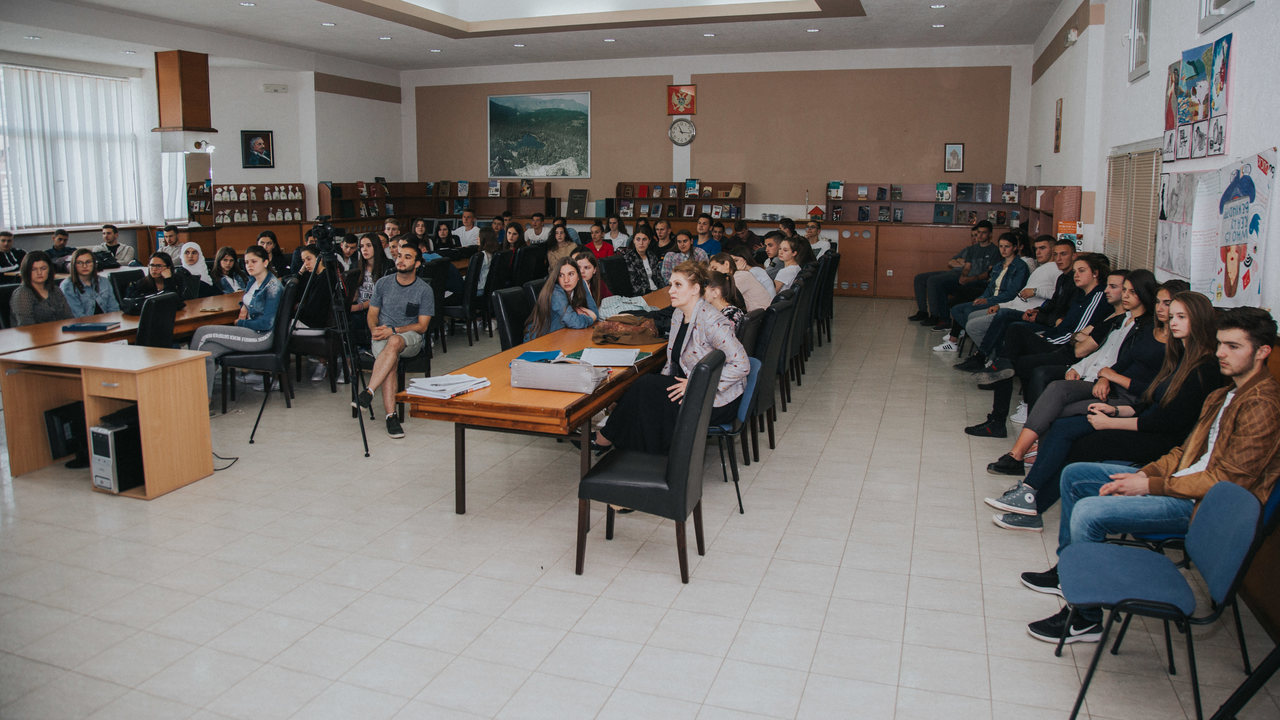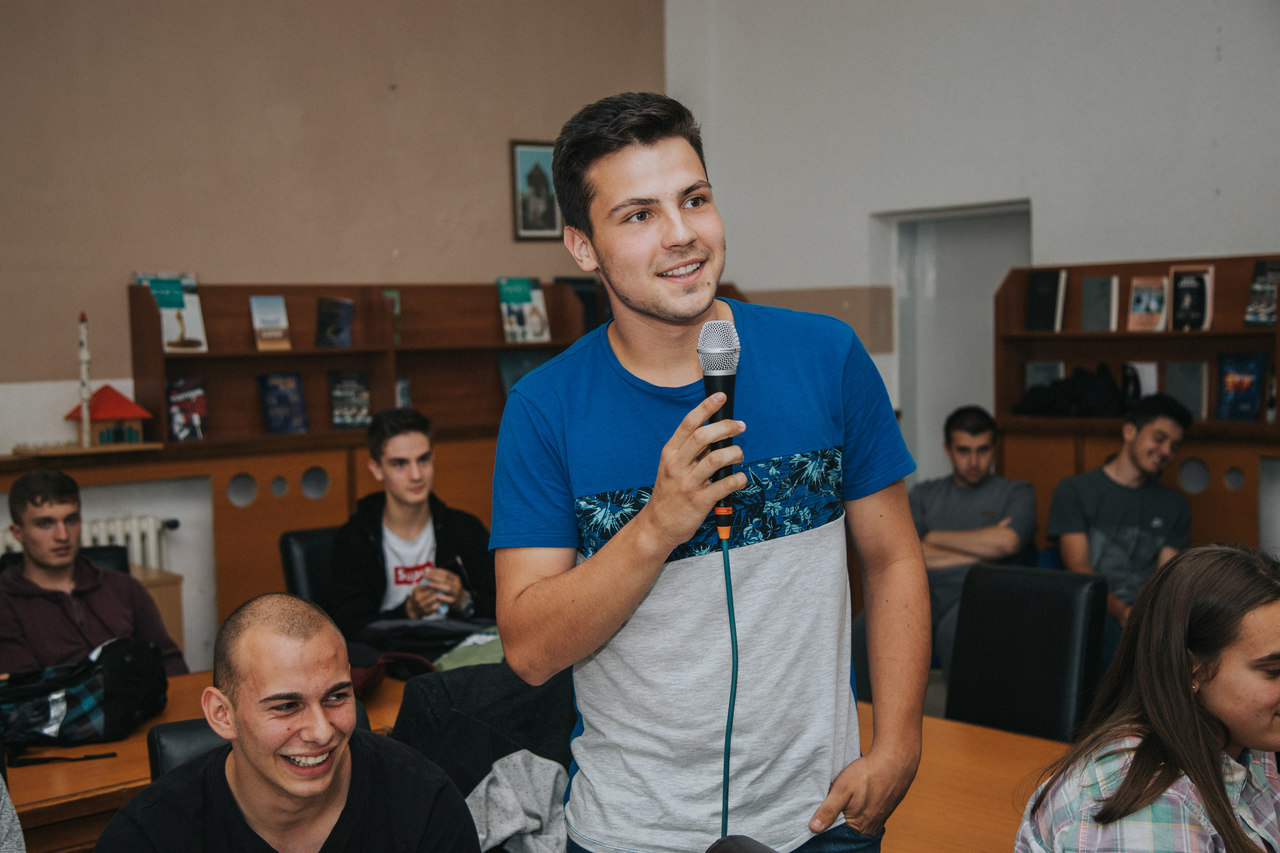Active approach of all parts of our society, as well as networking of student and educational structures, is very important to confront elements that lead to extremist ideas, as it was concluded at the fourth public debate ‘Dialogue in the community – prevention of radicalization and violent extremism‘ organized by the Centre for Civic Education (CCE), which drew the attention of large number of students of the Mixed High school ‘Beco Besic’ in Plav.
Milos Vukanovic, historian and CCE programme associate, assessed that the official educational system in Montenegro has not yet faced the challenge of familiarizing Montenegrin multicultural and multi-confessional society. Reflecting upon the significance of strengthening resistance of the communities to the threats of radicalism and extremism, he emphasized: ‘It is easy to notice a pattern that says that the flame of fear is fuelling ignorance that further arouse hatred. We have heard a lot about this fear of diversity, fear of a fictitious or real enemy. But, if we overcome this ignorance, we can prevent hatred or at least mitigated attitude towards it.’ Vukanovic also recalled concerning research findings indicating that a large number of young people would not enter into marriage with someone of other nationality. ’Throughout history, it has been noticed that people are afraid of differences, especially in homogeneous communities. Then those who are different, not only on the basis of their religious or national affiliation, but also by characteristics such as skin colour, social status, sexuality – are first on the target of hatred. Because of this misunderstanding, fear and hatred are directed towards those who are different,’ concluded Vukanovic.
Mirsad Barjaktarevic, president of the municipality of Plav, pointed out that the relationship of the state to the individual is one of the essential factors for preventing development of radicalism and extremism, but also that the purpose of the state is reflected in the readiness to protect every individual. ‘Extremists are people who have an opinion about themselves that is not based on real and truthful facts. They have very low opinion about others and do not acknowledge their successes, while they blame others for their failures and are not willing to admit their guilt. Extreme people believe in the correctness of their attitudes and they are not aware nor willing to affect others accept their own ignorance,’ said Barjaktarevic. He reminded that the right approach, when it comes to actions that can affect others, is that people should not do to others what they do not want others to do to them. He noted that ‘all our differences should not be perceived as flaws, but should be fostered as our wealth,’ accentuating that ‘political, religious, national differences and the spreading negative attitudes can easily provoke an argument between people who need to be aware that instead of several diversities that can be the basis of negative extremist attitudes, attention of the community should be focused on the similarities in which they can be united.’
Fuad Cekic, director of the Madrasah ‘Mehmed Fatih’, recalled spiritual aspect of man’s relationship with God and religion, stating that ‘about 90% of inhabitants of Montenegro are believers.’ He emphasized that ‘God sees beauty through diversity, contrary to man who seeks to unify the world, which does not correspond to the God’ s will that says in sacred books – if I had wanted everyone to be believers, I would have done it. Hence, his aim is not to impose faith on everyone, but to achieve spiritual unity.’ Furthermore, Cekic explained that ‘Religion disagrees with the concept of tolerance. Term tolerance means abide someone, and God did not create the world to abide each other, but to get to know each other, which represents higher level of tolerance.’ He pointed out that the essence of religion is not how many people will accept it because God only requires us to bear witness to the faith; not to force others to accept our attitudes, and whether someone will accept faith is a matter of his/her arguments, consciousness, diversity. ’Talking about the righteousness of religion is a right that only God has and every statement about who is a believer or not is not suitable to man.’ Cekic states that extremism occurs exactly when a man wants to assign to himself this divine right, to judge others about their faith or apply force in order to justify his attitude toward God. ‘Talking about your own idea, living your own idea in democratic societies is not forbidden, it is protected by freedom of speech, and extremism occurs when exclusivity, violent resolution and imposition of their ideas arise.’
‘It is God’s will that the world exists in diversity, beauty is in diversity. God requires of us higher level of understanding, and do not ascribe to yourself what God has left for himself,’ concluded Cekic.
Dusica Tomovic, editor-in-chief of Balkan Insight, explained her cooperation with people from different communities and with different opinions. ‘There is a lot of political, national, religious intolerance in our region which our editorial stuff has resolved by accepting that we all have right to have different opinions about developments in countries, and that our job, reporting, is always truth. For example, colleagues from Serbia and Kosovo write together and create texts that will not disturb people either from Kosovo or Serbia.’ She pointed out that it is essential to accept diversity even when it is ugly to us, such as ‘when you do not like the music your friend listens to, when you do not like the same sneakers, but also when it comes to differences of opinion related to politics or religion.‘ Tomovic also emphasized frequent misuse of terms radicalism and extremism in the media through equalization with differences that do not jeopardize rights other people, such as the right to life, the right to an opinion, the right to vigorously defend our attitudes, etc. ’As long as we do not jeopardize others, we have the right to different views on these things,’ she was firm. Young people as vulnerable group can go astray and become radical because of the ignorance or lack of understanding of the community in which they live. Therefore, Tomovic told the young people to love themselves and not to allow anyone to impose anything on them, not even in a community that might not accept them. She particularly warned of the dangers that lurk on popular social networks, which are hidden opportunity to create dangerous situations that can lead to radical thinking.
The public debate gathered around 80 participants, and next are planned to be held in Bijelo Polje and Rozaje. These lectures are organized within the framework of two projects Safe Net and Education for
Multiculturalism and Interculturalism, supported by the US Embassy through the Fund for Active Citizenship (fAKT) and the Ministry of Human and Minority Rights of the Government of Montenegro.
Maja Marinovic, Project assistant



